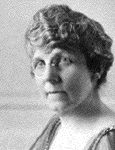 |
|
|
Florence Kling Harding
|
|
|
Warren Harding was elected by a landslide in 1920. It seemed that the public was pleased to again have a vigorous President with an eminently sociable First Lady. The Hardings described themselves as "just plain folks" and it was reported that the First Lady would often greet tourists at the White House. She was known as a successful hostess at huge receptions and garden parties. Unbeknownst to most of the public, however, the Hardings defied Prohibition and regularly served liquor for the President and his close friends. Florence Harding enjoyed playing bartender and the President's cronies enjoyed having her around. They called her "Duchess" and even the President referred to her as such. Florence was devoted to the achievement of high political office for Warren. At the time of their marriage, she was a divorce with a young son. Her father, an extremely wealthy banker in Marion, Ohio, strongly opposed her relationship with Harding (who was five years Florence's junior.) After the marriage, Florence's father did not speak to her for some seven years. She once said, "I have only one-real hobby-- it's my husband." Without his strong willed wife, poker-playing Warren probably would not have become President. It is said that Florence insisted that he run for the nation's highest office. Although he didn't want to be President, She certainly wanted to be First Lady! The Harding administration was known for being scandal-ridden and corrupt. President Harding once said that, "In this job I am not worried about my enemies. It is my friends who are keeping me awake." This bitter remark referred to the members of Harding's so-called "Ohio Gang," the cronies who turned out to have been poor friends indeed. In an effort to shore up his declining public image, the President and First Lady embarked on a cross-country "Voyage of Understanding" in June 1923. On August 2, the President died in San Francisco, probably of a cerebral blood clot. Florence eventually burned almost all the presidential papers, an act which has certainly served to cloud the truth regarding the Hardings' knowledge of the corruption around them. Florence Harding survived her husband by only little more than one year, dying in 1924 of complications relating to chronic kidney disease. |